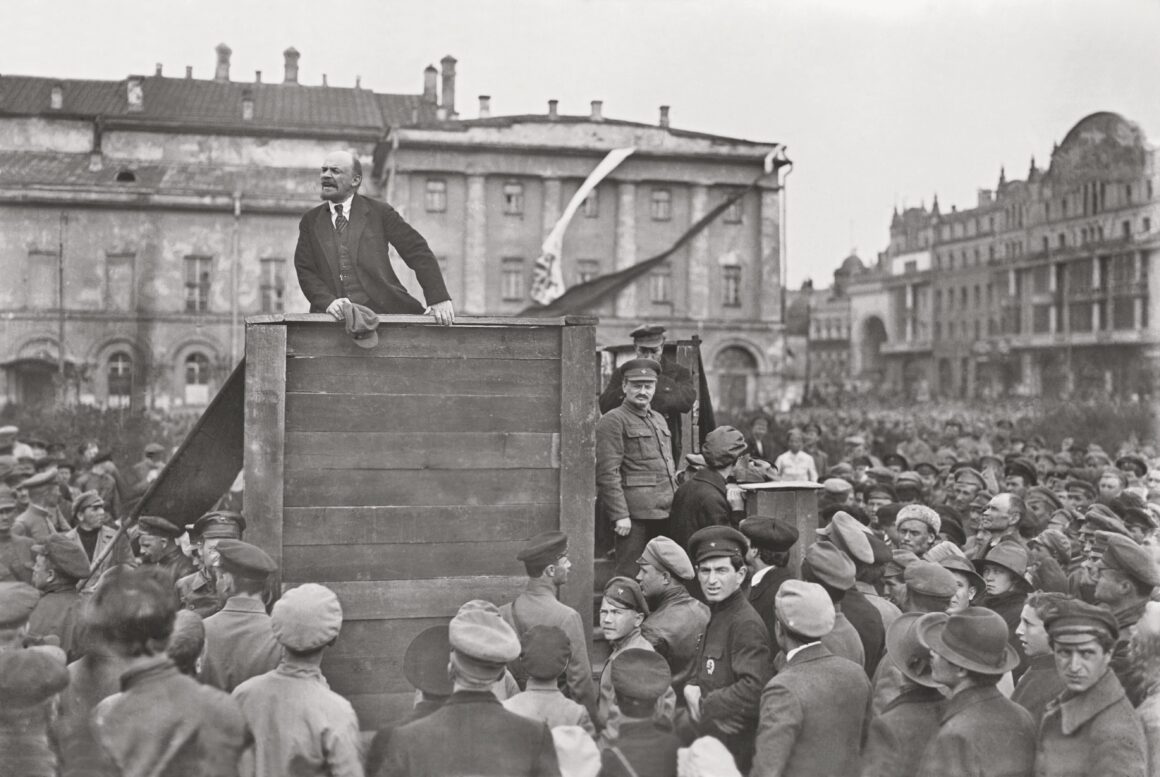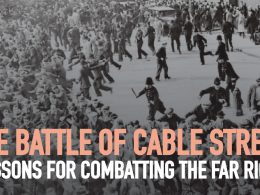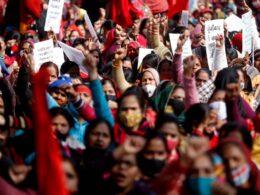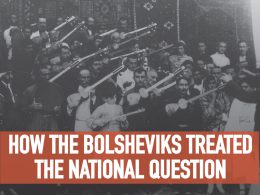By Manus Lenihan
Placards with the image of the Russian revolutionary Vladimir Lenin appeared at a pro-trans rights protest in Dublin last week. Former minister Michael McDowell took the opportunity to write an opinion piece in The Irish Times arguing that human rights activists should regard Lenin as an ‘odious’ figure. For a short article, he manages to squeeze in a lot of dodgy claims about history.
He starts by asking why anyone would admire Lenin, who died nearly a century ago. He acknowledges that Lenin’s government decriminalised homosexuality (76 years before the southern Irish state did) – which is surely explanation enough. He adds that Stalin and Putin both engaged in LGBTQ-phobic persecution. This would be an excellent and relevant point if Stalin or Putin had been on that placard.
Why Lenin?
There are other reasons, too, why many people admire Lenin: his government took the Russian Empire out of the senseless slaughter of World War One, shared the land of the nobles to tens of millions of farmers, and gave independence or autonomy to many national and ethnic groups who the Russian Empire had crushed. Other legacies of the Russian Revolution of 1917 include free healthcare, vastly expanded access to education, and a massive expansion of women’s rights.
The protesters who carried images of Lenin may also have been inspired by his writings, such as State and Revolution, which outlines a vision of participatory democracy and equality leading to ‘the withering away of the state,’ i.e., an end to all state violence and coercion.
McDowell writes as if he’s giving friendly advice to naive fellow human rights activists. But while workers in Russia achieved all of the above in a very poor, war-torn and underdeveloped country, McDowell was in the Irish government when it was still a crime to be gay in Ireland, and in a later stint in government, he attacked abortion rights and asylum seekers. So, don’t expect to see Michael McDowell placards at the next protest.
Civil War
McDowell makes no mention of the Russian Civil War. This brutal conflict was kicked off when tens of thousands of rich people, military officers, anti-Semitic thugs, warlords and Cossacks united to form the White Armies. They cut the country’s internal supply lines, causing famine and economic collapse. The workers’ militias defeated the Whites in the first battles and treated them with mercy afterwards. Even so, the Whites resumed their war, with their leader Kornilov ordering them in February 1918 to ‘Take no prisoners. The greater the terror, the greater will be our victory.’1 The Whites were as good as his word, and everywhere they marched, supporters of the new Soviet government – mostly workers and poor farmers – were slaughtered.
As events spiralled into complete chaos, all sides in this war committed atrocities. But the responsibility for the war rests with the Whites. Lenin’s and the Red Army offered them favourable peace settlements, but they refused. They were undoubtedly the worst offenders when it came to wanton bloodshed. In 1919, 50,000-200,000 Jewish people were murdered, some by supporters of the Rada in Ukraine, others by White Guards.
These killers wore British uniforms and carried British rifles. This is because foreign powers, including Germany, Britain, France, Japan and the United States, supported the various White Armies from day one. It’s safe to say that without the help of foreign powers, the Whites would have only been able to hold together small guerrilla forces. Instead, they were able to wage titanic campaigns against Moscow and St Petersburg. But they lost because they had far less popular support than the Communists. The Soviet Republic won this war and survived despite having no international allies and, at the start of the war, no army. But the country was left isolated, starving and in ruins.
This context – of an all-out war and a desperate struggle for survival – is missing from McDowell’s claims about Lenin supposedly shooting people just for disagreeing with him. McDowell may be shocked to learn that all the countries involved in both world wars curtailed democratic rights and committed ruthless acts of violence. We could only speculate as to how a government in Britain or the US would react if a foreign-backed insurgent army made a bloody conquest of three-quarters of their territory.
Appreciating Lenin as a writer and political leader is not the same thing as giving a blanket subscription to everything he said or did under the unimaginable pressures of the Civil War. In the same way, when people praise Abraham Lincoln, they are indicating opposition to racism and slavery. They are not arguing that Atlanta should be burned to the ground.
Getting the facts wrong
The above are issues of context, but McDowell gets a lot of facts wrong too. He writes that Lenin was responsible for the first mass executions in modern history, for inventing totalitarianism, and even for coining the phrase ‘liquidation.’ This completely ignores what European empires were doing in Africa and Asia, not to mention back home. For example, in Paris in 1871 when the state massacred tens of thousands of workers and poor people for their participation in the revolutionary Paris Commune.
Totalitarianism was born not from the elected workers’ councils of 1917 but from the First World War and from the racism and violence that were part and parcel of imperialism. A British officer wrote about Drushkin, a White politician who took pleasure in hunting Bolsheviks, that ‘liquidation’ was ‘his own favourite term!’2
McDowell also repeats an old myth that the Tsar was not that violent. Just two examples, the devastation in Central Asia in 1916 and the mass executions following the 1905-07 Revolution, suffice to refute his claim. And no, Lenin did not support, in words or in actions, forced collectivisation or the ‘liquidation of the kulaks’, which Stalin carried out years later.
While McDowell mentions the Socialist Party, the placards and hammer-and-sickle flags did not belong to us (or to any of the other groups he mentions). Like Lenin himself, we do not tend to go in for such personalised displays. Such images also have baggage. Tragically, Lenin’s image was hijacked by Stalin and his successors after his death. With LGBTQ+ rights as with so much else, the Stalinist tradition diverged radically from Lenin’s politics, even as they promoted his image in a quasi-religious way. He predicted this when he wrote: ‘During the lifetime of great revolutionaries, the oppressing classes constantly hounded them, received their theories with the most savage malice, the most furious hatred and the most unscrupulous campaigns of lies and slander. After their death, attempts are made to convert them into harmless icons.’3 But in Lenin’s case, it is still necessary to answer the hatred and slander. If you would like to learn more, the author of this article has also written Revolution Under Siege, an ongoing blog series and podcast on the Russian Civil War. Find out more at 1919Review.wordpress.com.
- Smith, S.A. Russia in Revolution: An Empire in Crisis 1890 to 1928, Oxford University Press, 2017, p 198
- Teague-Jones, Reginald. The Spy Who Disappeared, Gollancz, 1990 (1991), p 177
- Lenin, Vladimir. The State and Revolution, 1917. Chapter 1. https://www.marxists.org/archive/lenin/works/1917/staterev/ch01.htm












